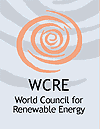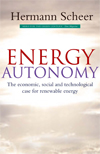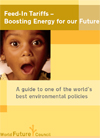 WCRE Press Release, November 10th, 2005
WCRE Press Release, November 10th, 2005...while postponing acting on national level
“The UN system is inappropriate to vigorously push the mobilisation of renewable energy”, said Hermann Scheer, General Chairman of the World Council for Renewable Energy (WCRE).
Numerous contributions to the Beijing International Renewable Energy Conference (BIREC 2005) practically proved the possibility of an accelerated upgrading of renewables on global level. The conference made clear that this process would not constitute a supplementary burden to national economies but rather would offer new economic chances to seize. Renewables could save the climate in a much more efficient way than fossil emission trading in the Kyoto framework currently does.Despite this evidence of the conference’s findings, the 100 governments represented at Beijing were not willing to rally behind an ambitious strategy. The final Beijing Declaration on Renewable Energy for Sustainable Development does in no way go beyond previous non-binding international conference declarations, e.g. of the Johannesburg summit in 2002 nor of the “Renewables 2004” conference in Bonn.
Instead of that, the Beijing declaration highlights that the UN Commission on Sustainable Development (CSD) will make energy the major focus of its upcoming debate cycle in 2006/2007. Consequently, talking about renewables will continue on global level while postponing action for renewables will continue on national level.
The UN system is still marking time, leaving the vast potential of renewable energies unemployed. As existing conflicts in the energy debate are not tackled in this framework, it is impossible to overcome them.
We welcome that China will initiate a dynamic development of renewable energy technolo-gy capacities by adopting a feed-in tariff model for renewable electricity generation resembling the German Renewable Energy Law.
New global strategies have to be developed. It is the aim of the upcoming World Renewable Energy Assembly (WREA) to create a forceful alliance for renewable energies. Non-binding declarations of intent are obsolete. There is no more time to waste for renewable energy acceleration.
For detailed information concerning the programme of the World Renewable Energy Assembly (WREA) 2005, including the Second International Parliamentary Forum on Renewable Energies, please refer to www.wrea2005.org and www.ipf2005.org. Please find the updated WREA programme and further information on www.wrea2005.org .



